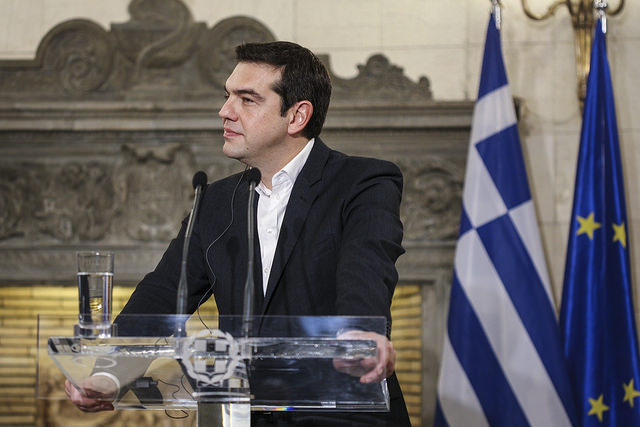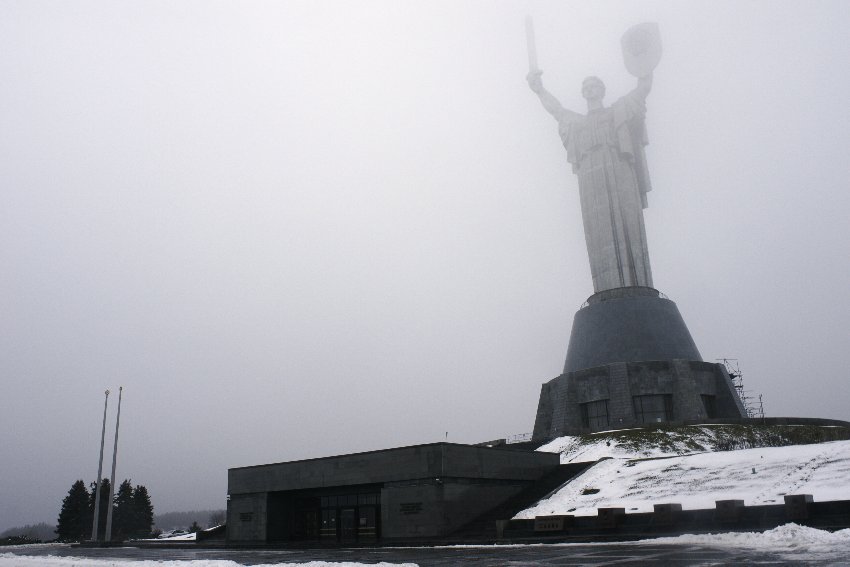Nothing Found
Sorry, no posts matched your criteria
Sorry, no posts matched your criteria
 Greece’s economic woes feature daily on the British broadsheets. The high drama negotiations between Greece and Europe have evoked a narrative akin to that of David and Goliath. Yet as Europe’s politicians attempt to balance party politics with economic reform, the fear of a Grexit is real. While such a move has obvious financial implications for the Eurozone, Europe needs to consider the geopolitical consequences of a Grexit with equal vigour.
Greece’s economic woes feature daily on the British broadsheets. The high drama negotiations between Greece and Europe have evoked a narrative akin to that of David and Goliath. Yet as Europe’s politicians attempt to balance party politics with economic reform, the fear of a Grexit is real. While such a move has obvious financial implications for the Eurozone, Europe needs to consider the geopolitical consequences of a Grexit with equal vigour.
Nobody is quite sure what a Grexit would look like, but let’s presuppose a breakdown of negotiations did occur whereby Greece was economically and politically ostracized from the EU. Who would Greece turn to for international credibility and support? Would it, for instance, shift completely away from Europe, and seek a new era of solace with Russia?
It’s no secret that PM Alexis Tsipras is fond of Greece’s Christian Orthodox partner. His proactive engagement of Russia over the past 6 months hasn’t been well received by his European counterparts. But Tsipras is no fool. He knows that using Russia as a bargaining chip requires more diplomatic maneuvering than simply playing Europe off against Russia. In geopolitical terms, there’s little Russia can offer to help redress either the Greek economy or Greece’s international standing. While the planned extension of a Russian gas pipeline through Greece is something to watch with interest, we shouldn’t assume that the recent MoU premeditates a general Greek realignment from Europe to Russia. This planned extension has in itself become a protracted process of diplomatic negotiations and delayed timelines. Greece doesn’t stand to benefit from this MoU anytime soon.
More broadly, Greece is hardly in a position of power in its dealings with Russia. Unsustainable levels of debt have placed the state in a vulnerable position, and risk of economic exploitation by Russia for immediate financial remedy seems shortsighted at best. We also shouldn’t underestimate the political realism of Putin and his calculated antagonism of the West. Putin is no doubt aware that overplaying his relationship with Greece may compel the West to inflict harsher sanctions and stricter policy positions on Russia. That being said, recent history demonstrates Putin’s unpredictability—a strategic practitioner guided as much by realpolitik logic as his cloudy nationalist rhetoric.
By considering the Greece–Russia scenario, we’re able to uncover the key geopolitical consequence of a Grexit: the fear of non-Western power penetration. Could China, for instance, enhance relations with Greece as a means for establishing a firm diplomatic and economic footing in the region? Of course, such scenarios need to take into account the reality of Greece’s standing security arrangements. The key point to remember here is that regardless of whether a Grexit occurs, Greece will still remain a member of NATO. That Greece is unlikely to risk its membership of this security alliance is something of a reassurance.
On the other side of the Atlantic, the Grexit possibility has become the latest in a series of headaches the US has had to endure as a consequence of European disunity. While America isn’t directly and widely exposed to the Greek economy, the potential effects of a Grexit are already being felt: Monday saw US stocks fall sharply following a heavy sell off of equities. On top of this, the US is also concerned by the regional security implications of a Grexit as it seeks a strong Europe that’s no longer heavily dependent on the US as its security guarantor.
The transatlantic relationship has become something reminiscent of a tired marriage dominated by growing frustrations and misplaced expectations. Frustrated by the decline of European defence spending, the US has made it clear that Europe must be both capable and prepared to defend its foreign and security interests. A Grexit is an unnecessary obstacle that hampers the likelihood of such a situation materialising anytime soon. This could even provoke individual EU states to reassess their approach to defence spending and procurement should cooperative European defence be realised as a failed dream. In any case, the US can’t retreat from Europe. Prolonged instability in both Ukraine, the Middle East and North Africa have global security implications that play into America’s global interests. The last thing the US wants is a weak and disunited Europe unable to protect its own security interests. A Grexit is a step in the wrong direction.
As the drama in Europe unfolds, the geopolitical implications of an isolated Greece don’t bode well for European security. And beyond security and economic implications, it’s crucial that we also give pause to consider how a Grexit would affect migration, security and energy pressures, particularly in the Western Balkans and Turkey.
What we must remember about a Grexit is that there are no certainties but rather a multitude of different scenarios. What is clear, however, is that such a move undermines European solidarity and Europe’s ability to be a force of consequence on the international stage. As the liberal dream of Western-centric order is replaced by a multipolar order of competing interests, the symbolic consequences of a Grexit set a dangerous precedent for the future. Europe needs to stand united.
Frustrated by European reluctance to arm Ukraine, two prominent former US officials—Hans Binnendijk, formerly senior director for defence policy at the US National Security Council, and John Herbst, US ambassador to Ukraine from 2003 to 2006—recently called in a New York Times piece for the imposition of what they have labelled ‘the Mariupol Test’. They argue that if and when the rebels move on the south-eastern Ukrainian port city of Mariupol, the West must punish Moscow and its minions by giving Kiev the military wherewithal to expel Russian forces from its territory, doubling down on sanctions and, perhaps most seriously of all, ‘suspending Russia from the Brussels-based Swift financial-messaging system’, a measure which, they assert, ‘could cripple the already reeling Russian economy’. Read more
 Scotland’s referendum on 18 September is a choice between union and significance or independence and irrelevance. Voters will decide whether to stay in the United Kingdom or to opt for full independence. The result will be unpleasant for Britain regardless of the vote. An opinion poll on 4 September put the pro-Union ‘No’ vote at 39% and the pro-independence ‘Yes’ vote at 38%, with 23% undecided. Over the last six weeks all the political momentum has been towards the independence camp. The large undecided vote reportedly reflects Scots Labour voters mulling their options while an increasingly panicked ‘No’ campaign makes concessions to hand tax and spending powers to the Scottish Government if they stay in the Union.
Scotland’s referendum on 18 September is a choice between union and significance or independence and irrelevance. Voters will decide whether to stay in the United Kingdom or to opt for full independence. The result will be unpleasant for Britain regardless of the vote. An opinion poll on 4 September put the pro-Union ‘No’ vote at 39% and the pro-independence ‘Yes’ vote at 38%, with 23% undecided. Over the last six weeks all the political momentum has been towards the independence camp. The large undecided vote reportedly reflects Scots Labour voters mulling their options while an increasingly panicked ‘No’ campaign makes concessions to hand tax and spending powers to the Scottish Government if they stay in the Union.
The referendum asks for a simple ‘yes/no’ answer to the question ‘Should Scotland be an independent country?’ A ‘yes’ vote, no matter how small the margin, puts Scotland irrevocably on track to full independence by March 2016. A narrow ‘no’ vote to stay with the Union is likely to be used by pro-independence campaigners to justify a continued push for full independence, as the Scottish National Party (SNP) has done through prior devolution votes in 1979 and 1997. A large ‘no’ vote, say more than 55%, is not likely given polling trends. So the best pro-Unionists might hope for is grumpy Scots, like the Canadian Québécois, hankering for independence and with expanded powers to block London’s attempts to run a ‘United’ Kingdom. However Scotland votes, a British general election, to be held no later than 7 May 2015 will give the departing or reluctantly-staying Scots one more chance to thumb their nose at Westminster. Read more
Pinged all devices on the Internet, here's a map of where they're located :) pic.twitter.com/G3fiNcKCul
— John Matherly (@achillean) August 28, 2014
This week, the Internet governance debate descends on Istanbul, with the start of the ninth round of the Internet Governance Forum. It’s been a busy year in the field, so the non-binding, non-decisionmaking body will have plenty to discuss. Armed with a ringing endorsement from NetMundial, fingers are crossed that the Forum’s strengthened mandate will produce more tangible takeaways for participants and that its mandate will be renewed before its 2015 expiry date. For a bit of background on governing the net, check out our blog series of the same name. You can also follow the proceedings in Turkey live here.
‘A perpetual state of siege.’ That’s how reporter Elizabeth Weise described cyberattacks on American companies following news of major attacks targeting JP Morgan and other major banking institutions. The FBI is investigating possible links to Russia. Read more
Russia continues to generate the top international security stories for this week. On Tuesday, Russian President Vladimir Putin justified his actions in Crimea in an impassioned speech to the Parliament (the official translation available here). Amidst a narrative of Crimea in Russian history and nationalist sentiments, Putin remarked:
In people’s hearts and minds, Crimea has always been an inseparable part of Russia. This firm conviction is based on truth and justice and was passed from generation to generation, over time, under any circumstances, despite all the dramatic changes our country went through during the entire 20th century… Naturally, we could not leave this plea unheeded; we could not abandon Crimea and its residents in distress. This would have been betrayal on our part.
Putin also takes shot at what he sees as weak international institutions and the preference of western partners led by the US to ignore international law. It’s certainly an insight into how the historical narrative is being shaped within Russia, and worth reading in full. For other views on the speech, here’s the New Yorker, The Nation and a useful Washington Post fact check. Read more
 Back in 1944, the Soviet armies executed a swift strategic campaign aimed at defeating the Nazi occupation forces and liberating Ukraine. Seventy years on, Ukraine is facing another major strategic standoff, this time between Russia, the new regime in Kiev, and NATO.
Back in 1944, the Soviet armies executed a swift strategic campaign aimed at defeating the Nazi occupation forces and liberating Ukraine. Seventy years on, Ukraine is facing another major strategic standoff, this time between Russia, the new regime in Kiev, and NATO.
It started as a popular protest against widespread corruption, paralysis of the judicial system and the continuous power struggle between competing oligarchic clans. It has now turned into the most serious political-military crisis Europe has seen since August 2008, when Russia and Georgia clashed over Southern Ossetiya and Abkhazia.
For the third time in six years, Moscow is using its military in support of its strategic objectives along the periphery of the former Soviet Union and in areas of vital importance to Russia (Eastern Mediterranean). The deployment of Russian forces across the Crimean Peninsula occurred at a time when Russia was staging its largest wargames in the western strategic theatre, involving over 150,000 troops, 880 main battle tanks, over 200 combat and support aircraft, and more than 80 warships and auxiliaries. Read more
Perhaps a bit dazed from the raucous success that was Safer Internet Day 2014, the European Commission may have taken the motto ‘let’s create a better Internet together’ a bit too far. Last Wednesday, the Commission released a proposal for the adoption of ‘concrete and actionable steps’ to globalise governance of the Internet’s architecture. On the surface, this proposal is sound, and frankly nothing new, the Commission having highlighted internationalisation in its Digital Agenda launched back in 2010. But the European Union is using this tactic as part of its broader effort to position itself as an honest broker in critical negotiations to shape the future of Internet governance, and this tactic will do nothing more than undermine its own interests in the discussion.
The proposal calls for clear timelines for the globalisation of the Internet Corporation for Assigned Names and Numbers (ICANN), strengthening of the Internet Governance Forum, increased transparency, accountability, inclusiveness, the safeguarding of open, unfragmented Internet, among other issues. These are noble and necessary changes to the governance of the Internet. However, in putting the cart before the horse, these proposals will further efforts to push Internet government over governance. Read more
The balance of military power in Asia is of critical interest to Australia and other regional states. China’s modernisation of its defence forces has led to a reorganisation of its command structure, which was announced late last year. Greater emphasis will now be given to air and defence forces rather than land based forces. This shift in emphasis will be helped by the sales of weaponry from other countries, particularly from the European Union.
In principle, the EU maintains an embargo on weapons sales to China but it’s getting a little frayed around the edges. The 16th EU–China summit meeting held in Beijing in late November last year made no change to the embargo. Nevertheless various media reports have given details about the sale of technology that has been incorporated into Chinese weapons systems.
The embargo was imposed after the Tiananmen Square massacre of 1989 (PDF). The EU took the view that it didn’t want any of its weapons to be used in suppressing dissent in China. That view remains an important reason for maintaining the embargo, but the possibility of EU arms being used for external aggression has been added to the criteria for maintaining it. Abandonment of the embargo might risk the interpretation that it was wrong to impose it in the first place after the Tiananmen Square violence. Read more
The conflicts—some might be better described as spats—between China and a number of European countries might provide as many clues about China’s aspirations and behaviour as anything said in California between Barack Obama and Xi Jinping.
The sharpest issue of the moment is a trade dispute over the European Union’s intention to slap heavy duties on solar panels from China on the ground that they’re suspected of being heavily subsidised and sold below their true cost, being dumped on the European market. The EU has given China a couple of months’ reprieve to disprove the dumping allegation but if it fails to satisfy the EU within that time, then the duties will rise to an average of 47.6% from the present rate of nearly 12%. Read more
Last year the Obama Administration rebranded one of its signature foreign and strategic policy initiatives. What for months had been described as America’s ‘pivot’ towards Asia—essentially, a set of policies aimed at reinforcing American hegemony in the face of a rising China by reinvigorating US diplomatic and military engagement throughout the region—had suddenly become known, less emphatically, as the Asian ‘rebalance’.
Ordinarily, this mightn’t be all that significant. American foreign policies are often boiled down for public consumption into simplistic catch-cries—think ‘hearts and minds’ in Vietnam or the beleaguered ‘reset with Russia’. And while these help to communicate complex ideas to a domestic audience that is for the most part either distracted, detached or uninformed, the slogans themselves rarely betray anything substantive about the prospects or limitations of the policies they represent, the nuances in their execution or their underlying strategic logic.
In this case, however, the official shift from ‘pivot’ to ‘rebalance’ was unusually revealing, because it reflected concerns about abandonment among Washington’s allies and clients outside of Asia, especially in Europe and the Middle East. For them, an American pivot toward Asia implied the possibility of Washington pivoting away from their regions and divesting responsibility for strategic functions on which which they continue to depend. Read more